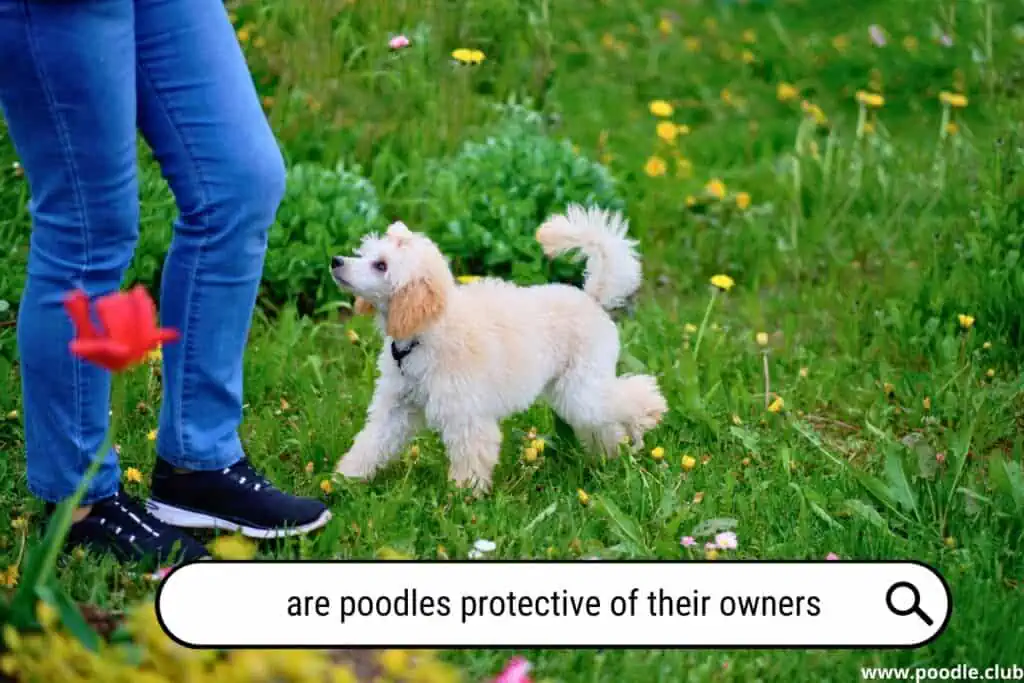Are Poodles Protective of Their Owners? [Loyalty]
Beneath the Poodle’s iconic curls and air of elegance lies a dog of sharp intellect, unmatched trainability, and fierce loyalty. While these stylish canines may evoke images of posh lifestyles, there’s far more to these dogs than their glamorous exterior suggests.
Unveiling their true nature, you’ll discover a steadfast protector and a loyal companion, making them a perfect match for families and individuals alike.

Poodles excel at safeguarding their loved ones, thanks to their innate intelligence and intuitive prowess. They possess a keen sense for detecting potential danger, responding with vigilance rather than overt aggression. They’re swift to alert their human family to anything they perceive as out of the ordinary, showcasing their intrinsic protective instinct.
Beneath their sophisticated demeanor lies an assertive, gentle nature, married with an unwavering devotion to their human family. Poodles represent a unique blend of elegance and protection, making them an excellent choice for those seeking a refined yet vigilant companion.
Poodle Overview
Poodles come in various sizes, including standard, miniature, and toy varieties. These elegant dogs are incredibly adaptable and versatile, making them a popular choice for many dog owners. Funny thing is that despite their fancy haircut, they are actually an intelligent and protective breed.
A standard poodle is the largest of the three types, with a height typically ranging between 18 to 24 inches. Miniature poodles, on the other hand, tend to be around 11 to 15 inches tall. Toy poodles are the smallest, usually standing around 9 to 11 inches. You could say they’re like a cute, miniature version of their standard-sized siblings, perfect for those who enjoy pocket-sized pets!
Regarding their appearance, all poodles share a similar curly coat, which gives them that iconic “poodle look.” This coat is not only stylish but also low-shedding, making them suitable for people with allergies. But don’t be fooled by their fancy appearance; they’re not just a pretty face!
PuppySpot is a reputable dog marketplace where you can browse and find compatible puppies right from the comfort of your home. They have placed over 200,000 puppies into homes in the US!
A poodle’s curly coat can be deceiving; they are actually quite the athletic and intelligent dogs. This German water retriever may not strike you as a fierce protector looking at that well-groomed exterior, but poodles are known to be protective and loyal to their owners, always ready to “splash” into action! Whether you have a standard poodle guarding your castle or a toy poodle protecting your lap, rest assured that these canine companions will have your back.
In conclusion, poodles are not just about fancy haircuts and prancing around the dog show circuit. These versatile dogs, with their wide range of sizes, distinctive curly coats, and loyal nature, make for excellent companions and protectors for people of all stripes. So go ahead and embrace the poodle magic, as who wouldn’t want a curly-coated sidekick by their side?
Poodle Temperament and Behavior
Poodles are known for their unique combination of intelligence, loyalty, and energy. This breed makes for both affectionate companions and protective guardians of their owners. In this section, we’ll examine the different aspects of poodle temperament and behavior.
Intelligence and Trainability
Poodles are often hailed as one of the smartest dog breeds due to their remarkable intelligence and trainability. They excel at learning new tricks and commands, making them a popular choice for obedience training, agility, and other canine sports. Their aptitude for learning makes mental stimulation an essential part of their daily routine, as poodles can become bored and mischievous without enough intellectual challenges.
Loyalty and Affection
The loyalty of poodles towards their owners is just as noteworthy as their intelligence. Known for being attentive and affectionate, poodles create strong bonds with their human families and are inclined to be naturally protective of them. Since they crave companionship, poodles should not be left alone for extended periods, which may cause them to develop separation anxiety. Their loyalty also extends toward other pets in the home, generally getting along well with other dogs and animals.
Energy and Exercise Needs
While not as rambunctious as some breeds, poodles still possess their fair share of energy. They require regular exercise to maintain their physical health and stave off boredom. A daily walk or a game of fetch in the backyard should suffice for their physical needs, but don’t forget to engage their minds, too! Puzzle toys, interactive play, and basic obedience training can all help to ensure that your poodle remains happy, healthy, and mentally well-balanced.
In conclusion, the poodle’s temperament and behavior make them a fantastic choice for those seeking a loyal, intelligent, and energetic companion. Remember to cater to their exercise and mental stimulation needs, and your poodle will reward you with unwavering love and affection!
Poodles as Protective Companions
Protective Instincts and Guard Dog Potential
Poodles may not be the first breed you think of when considering a protective companion, but their natural instincts and intelligence make them surprisingly effective in this role. They are naturally alert and observant creatures, keeping a keen eye on their surroundings. While not as aggressive as some breeds (like Rottweilers or German Shepherds), an intruder might be surprised to find themselves facing the protective nature of a poodle.
Barking and Alerting
One of the key factors that make poodles good watchdogs is their tendency to bark when they sense something amiss. This alert behavior can be a helpful trait in a protective companion, as it serves as an early warning system for their owners. Poodles are often quick to alert you if something is out of the ordinary, letting you know that it’s time to take action. However, their barking can sometimes be a double-edged sword – if you have close neighbors or live somewhere with noise restrictions, you may find yourself struggling to keep your poodle’s vocal enthusiasm in check.
Socialization and Training for Protection
Investing time in socialization and training is crucial to help a poodle reach its full protective potential. Utilizing positive reinforcement techniques will keep your poodle motivated and eager to learn new commands. As poodles are highly intelligent dogs, they can easily grasp basic obedience and more advanced protection skills.
Socializing your poodle from a young age teaches them to differentiate between normal, everyday situations and potentially dangerous ones. This helps prevent unnecessary aggression and barking, making them more effective protectors.
In conclusion, while poodles might not have the imposing presence of a Rottweiler or a Doberman Pinscher, they can still act as protective companions due to their natural instincts, quick learning abilities, and keen alertness. So, the next time you’re looking for a pup that can keep you safe while also melting hearts with their curly-furred cuteness, don’t underestimate the power of the poodle!
Poodles with Family Members and Children
Poodles are known for their loyalty, friendliness, and strong sense of companionship, making them excellent dogs for families and owners with varying lifestyle needs. With their intelligent and affectionate nature, Poodles tend to form strong bonds with their families and adapt well to different people, including children and adults.
Interactions with Children and Kids
Poodles are well-suited for families with children, as they typically exhibit a gentle and patient demeanor with kids. They love engaging in fun and playful activities, both indoors and outdoors, making them fantastic playmates. However, it is essential to teach children how to properly interact with Poodles, as well as supervise their encounters to ensure the safety and well-being of both the dog and the child.
One example of Poodles being good with kids is their ability to sense when a child is upset or sad, offering comfort and companionship to help cheer them up. With their intuitive nature and high emotional quotient, Poodles can make a child’s day brighter with just their presence.
Adapting to Different Family Members
Poodles adapt well to various family member dynamics, including adults and family members with different temperaments. They are protective and loyal to their people, making them great watchdogs as well as loving companions. This adaptability can be seen in the way Poodles adjust their behavior to the energy levels and activity preferences of each family member.
For example, when interacting with an energetic child, a Poodle may engage in lively play sessions, while with a more reserved adult, they’ll stay calm and relaxed. While not overly aggressive, Poodles still take their role as protector seriously, and it’s not uncommon for them to alert their owner to strangers or other potential dangers in a confident, clear manner.
In short, Poodles make excellent family pets, thanks to their loyalty, adaptability, and friendly nature. Their versatility in adapting to different family members ensures that they can provide companionship and protection to all members of the household while keeping things light-hearted and enjoyable through a dash of humor and a sprinkle of wit.
Potential Challenges of Owning a Poodle
Managing Separation Anxiety
Poodles are quite sensitive and may exhibit separation anxiety if left alone for long periods. While it’s normal for dogs to miss their owners, poodles may become destructive, nervous, or high-strung when feeling lonely. So, watch out for those chewed-up shoes! To help your poodle cope, establish a consistent routine and provide puzzles or interactive toys while you’re away. Even better, teach your poodle how to say “au revoir” in French, so they know you’ll be back!
Dealing with Aggressive Behavior
Though poodles are generally friendly, some may display aggressive behavior due to anxiety, fear, or in response to other dogs. While it’s rare to see poodles throwing punches at the dog park, it’s crucial to tackle any signs of aggression early on. Regular exposure to various environments, socialization, and positive reinforcement can do wonders in preventing and correcting aggressive tendencies. Remember, poodles are like little French pastry chefs – they need proper training and practice to avoid any “battering” incidents.
Maintaining Regular Grooming Rituals
One of the most iconic features of poodles is their magnificent fur, which often throws a party on their body without permission. Regular grooming should be a top priority for poodle owners, as brushing and trimming are essential to keep their fabulous coats in top shape. As for the bathing schedule, stick to at least once every four weeks to preserve the natural oils and protection of their hair. Finally, make sure not to neglect those fluffy ears and show-stopping tails. After all, every poodle deserves to look like a true runway model!



![Are Poodles Vocal? [5 Ways]](https://poodle.club/wp-content/uploads/2023/05/are-poodles-vocal-768x512.webp)


![What is a Merle Poodle [Explained]](https://poodle.club/wp-content/uploads/2022/12/what-is-a-merle-poodle-768x512.webp)
